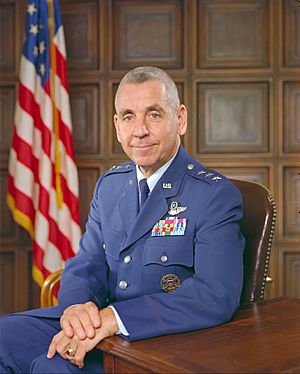Lincoln D. Faurer facts for kids
Quick facts for kids
Lincoln D. Faurer
|
|
|---|---|

Lieutenant General Lincoln D. Faurer
|
|
| Nickname(s) | Linc |
| Born | February 7, 1928 Medford, Massachusetts, United States |
| Died | November 7, 2014 (aged 86) McLean, Virginia, United States |
| Buried | |
| Allegiance | United States |
| Service/ |
United States Air Force |
| Years of service | 1950–1985 |
| Rank | Lieutenant general |
| Commands held | National Security Agency 71st Missile Warning Wing 16th Surveillance Squadron |
| Battles/wars | Korean War |
| Awards | Air Force Distinguished Service Medal Defense Superior Service Medal (2) Legion of Merit |
Lieutenant General Lincoln D. Faurer (February 7, 1928 – November 7, 2014) was a highly respected officer in the United States Air Force. He served as the director of the National Security Agency (NSA) and chief of the Central Security Service from 1981 to 1985. The NSA is a government agency that works to protect U.S. communications and gather intelligence from other countries.
Contents
Early Life and Education
Lincoln Faurer was born on February 7, 1928, in Medford, Massachusetts. He went to Central High School in Philadelphia and finished in 1945.
He then attended Cornell University before going to the United States Military Academy in West Point, New York. He graduated from West Point in 1950 with a science degree. At that time, he became a second lieutenant in the Air Force.
Later, Faurer continued his education. In 1964, he earned a master's degree in Engineering Management from Rensselaer Polytechnic Institute in New York. He also studied at the National War College in Washington, D.C., in 1968. While there, he earned another master's degree in international affairs from the George Washington University.
Military Career Highlights
After graduating from West Point, Faurer learned to fly planes. He earned his pilot wings in August 1951. He then trained to fly B-29 bombers.
Flying Missions and Reconnaissance
In 1952, he joined the 308th Bombardment Wing. From 1953 to 1955, Faurer flew special weather reconnaissance flights. These flights were done in WB-29 planes from Yokota Air Base in Japan.
After more training, Faurer returned to the U.S. in 1956. He became an aircraft commander for RB-47 planes. These planes were used for strategic reconnaissance, which means gathering information.
Missile and Space Work
In 1959, Faurer began working with missiles and space technology. He was assigned to the 2nd Air Force in Louisiana. There, he worked with different types of intercontinental ballistic missiles (ICBMs). These included the Atlas, Titan II, and Minuteman I missiles.
From 1964 to 1967, Faurer worked at the Defense Intelligence Agency in Washington, D.C. He was a technical intelligence officer, focusing on space systems.
Leadership Roles and International Service
After more training, Faurer took on several important leadership roles. In 1969, he commanded the 16th Surveillance Squadron in Shemya Air Force Base, Alaska. He then became the commander of the 71st Missile Warning Wing in New Jersey in 1970.
In 1971, Faurer served in the Panama Canal Zone. He later worked at the U.S. Air Force Headquarters in Washington, D.C. He also returned to the Defense Intelligence Agency as a deputy director.
From 1977, he served in Europe. He was the director for intelligence for the U.S. European Command in West Germany. In 1979, he moved to Brussels, Belgium. There, he became the deputy chairman of the North Atlantic Treaty Organization Military Committee. NATO is an alliance of countries that work together for defense.
In April 1981, Lincoln Faurer became the director of the National Security Agency (NSA). This was a very important role in U.S. intelligence. He was promoted to lieutenant general on September 1, 1979. He retired from the Air Force on April 1, 1985.
Awards and Recognition
Lieutenant General Faurer received many awards for his service. These include:
- The Air Force Distinguished Service Medal
- The Defense Superior Service Medal (with an oak leaf cluster for a second award)
- The Legion of Merit
- The Meritorious Service Medal
- The Joint Service Commendation Medal
- The Air Force Commendation Medal
He also received the National Intelligence Medal of Achievement. This award recognized his important contributions to the national intelligence community.
Life After Retirement
After retiring from the Air Force, General Faurer continued to be active. From 1986 to 1991, he was the president of the Corporation for Open Systems. This organization worked to promote international communication standards like OSI and ISDN.
He also served as the chairman of the Association for Intelligence Officers. He often shared his knowledge as a consultant on national security issues. For many years, he was the chairman of the board of directors for the National Cryptologic Museum Foundation. He held this position until October 2014.
Lincoln Faurer passed away on November 7, 2014. He was buried with honors at Arlington National Cemetery.
 | William Lucy |
 | Charles Hayes |
 | Cleveland Robinson |

